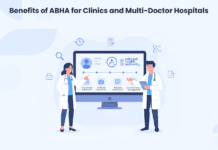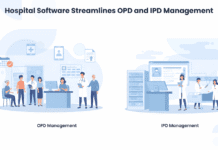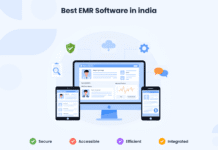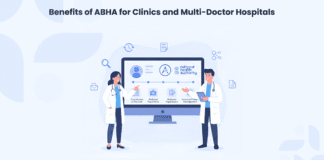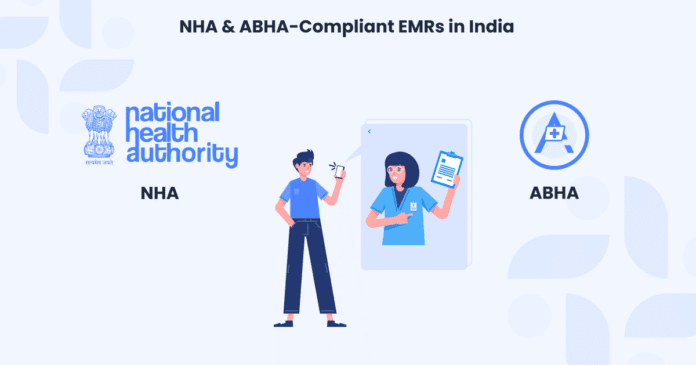
Healthcare in India is going through a big digital shift. The government wants every citizen to have their medical history stored securely, using a unique ABHA ID, also known as the ABHA Health ID or ABHA Health Card, in a way that can be accessed anywhere in the country when needed. This is where two big names come in: NHA (National Health Authority) and ABHA (Ayushman Bharat Health Account).
Now, you might ask: what does this have to do with EMR (Electronic Medical Records)? A lot, actually. If your clinic, hospital, or software is NHA & ABHA compliant, it means you’re connected to India’s official digital health ecosystem. Let’s break it all down.
What is the NHA?
The National Health Authority is the government body running the Ayushman Bharat Digital Mission (ABDM). Their job is to build a unified digital health system for the country.
Think of the NHA like the “traffic controller” of digital healthcare. It creates the rules, standards, and infrastructure so that different hospitals, clinics, labs, and software can all connect with each other.
Some of its key roles:
- Making sure patient data is secure and private.
- Setting standards for how EMRs, telemedicine apps, and hospital systems should work.
- Running the national health registries (for doctors, facilities, and digital health IDs).
Without NHA, every hospital would run its own isolated system, and patients would be stuck carrying files around forever.
What is ABHA?
ABHA stands for Ayushman Bharat Health Account, and it’s the centerpiece of India’s digital health plan.
It’s basically a unique health ID number given to every citizen. This makes the ABHA ID in healthcare a powerful tool to simplify how medical information is managed across India. You can think of it like an Aadhaar card, but only for health.
Here’s what ABHA does:
- Links your health records: Every lab test, doctor visit, prescription, or hospital report can be stored under one ID.
- Portable and digital: No need to carry X-rays, reports, or files; your doctor can access them online with your permission.
- Patient-controlled: You decide which doctor or hospital can see your records. No access without your consent.
For patients, this means convenience and safety. For doctors, it means faster, more informed care. Platforms like Healcard ensure all this happens smoothly while keeping the patient fully in control.
What Does “NHA & ABHA Compliant EMR” Mean?
When we say an EMR is “NHA & ABHA compliant,” it means the software has been designed to follow NHA’s rules and can directly connect with ABHA IDs.
In simple terms, it’s like having a clinic’s EMR system plugged into the national health network. Healcard, for example, allows clinics to generate ABHA IDs, link existing IDs, and manage patient records securely within the platform.
This way:
- You can generate or link a patient’s ABHA ID.
- Doctors can pull up records from different places (with the patient’s okay).
- Prescriptions and reports can be uploaded straight into the patient’s health account.
So compliance isn’t just a fancy label; it ensures the clinic’s software works smoothly with India’s healthcare future.
Key Features of a Compliant EMR
For an EMR to truly be NHA & ABHA compliant, it must:
Generate and Link ABHA IDs
Patients should be able to create their ABHA ID at the clinic itself or link their existing ID to their record. Healcard supports this directly in the software, making ID management simple and seamless.
Consent-Based Data Sharing
Nothing is shared without the patient’s permission. They can allow or deny access anytime.
Interoperability
The system must “speak the same language” as others. That means using international standards like FHIR, SNOMED, and ICD codes so that records from one hospital can be understood by another. Healcard’s EMR is fully interoperable and integrates with ABDM-approved APIs.
Privacy and Security
Patient records are encrypted, stored safely, and shared only through secure APIs as per NHA rules. Healcard follows these strict privacy protocols, ensuring patients’ trust that their data is safe.
Integration with National Registries
Doctors and facilities should be discoverable across India, making referrals and cross-city treatments easier. Healcard’s platform links clinics and professionals directly to national registries, making ABHA-enabled workflows smooth.
How to Check if an EMR is NHA & ABHA Compliant
This is the first question doctors or clinics usually ask: “How do I know if my EMR is really compliant?”
Here’s the simple way:
- Look for official ABDM integration: The EMR should clearly mention that it’s integrated with the Ayushman Bharat Digital Mission (ABDM). Healcard is ABDM-integrated.
- Check for ABHA ID support: You should be able to create, link, and use ABHA IDs directly inside the software.
- Verify consent features: Patients must be able to give or deny consent for data sharing.
- See if it’s on the NHA’s verified list: The NHA publishes a list of certified or integrated health-tech partners. If your EMR is on it, you’re safe.
If a vendor just claims compliance but can’t show you ABHA features or ABDM integration, that’s a red flag.
Benefits of Using an ABHA-Compliant EMR
For Doctors and Clinics
- Among the major benefits of ABHA-compliant EMR for clinics is that it cuts down paperwork and speeds up daily workflows.
- Access to the patient’s full medical history, even from other hospitals.
- Compliance with government standards (future-proofing).
Overall, the benefits of ABHA-compliant EMR for clinics go beyond efficiency; they ensure compliance, trust, and long-term readiness.
For Patients
- One of the biggest ABHA health ID benefits for patients is having a single health account for all records.
- Total control over who can see their information.
- No need to carry paper files everywhere.
These are just some of the key benefits of ABHA health ID for patients, giving them full control and convenience.
For the Healthcare System
- True interoperability allows different hospitals, labs, and clinics to finally “talk” to each other.
- A more organized, efficient healthcare ecosystem.
Data Security & Patient Trust
In healthcare, nothing matters more than trust, and that starts with secure digital health records in India. If patients feel their personal health information could be leaked or misused, they won’t use the system.
That’s why NHA compliance focuses so strongly on data privacy and security:
- All records are encrypted.
- Data can only move through secure government-approved APIs.
- Patients own their data; the system works on consent, not force.
When clinics use compliant EMR Software like Healcard, patients feel safe sharing their history. That trust makes consultations smoother, builds stronger doctor-patient relationships, and ultimately improves care.
How It Works in Real Life
Let’s take a real-world style scenario:
Rina, 35, lives in Ahmedabad. She creates her ABHA ID at a local clinic. Her doctor sees her old reports from Bangalore; no need for her to carry files or repeat tests.
After treatment, her prescription gets stored in her ABHA account.
Two months later, she’s in Delhi and falls sick again. She visits a new doctor, who, after getting her consent, views her updated history in seconds. Treatment continues without confusion or delay.
That’s the real power of an NHA & ABHA-compliant EMR platform like Healcard.
ABHA Progress: Government Action & Adoption Numbers
The government has been putting a lot of energy into making digital health a reality. Instead of patients carrying files everywhere, the idea is that one ABHA ID should hold everything. To make that happen, the National Health Authority has been busy: running awareness campaigns, registering hospitals and doctors in national databases, setting up the “Scan & Share” QR code for faster OPD check-ins, and even offering incentives to clinics that adopt digital systems. Importantly, the rules around privacy and consent make sure that patients stay in control of their records.
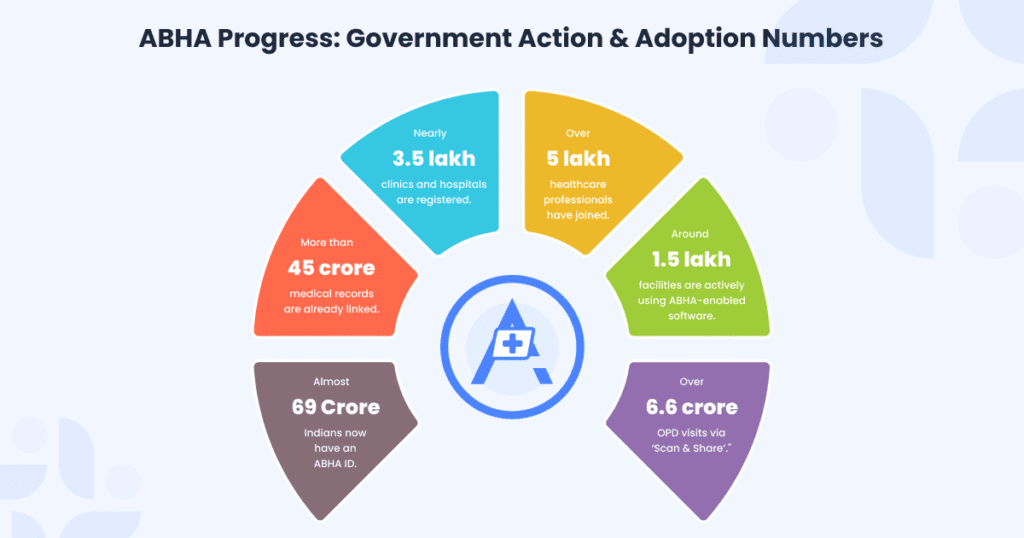
And people are already using it at scale:
- 69 crore+ people across India now have their own ABHA ID.
- 45 crore+ health records are already stored and linked digitally.
- 3.5 lakh clinics and hospitals are officially registered.
- 5 lakh+ healthcare professionals have joined the network.
- 1.5 lakh facilities are actively running ABHA-enabled software.
- 6.6 crore OPD visits have been completed using the “Scan & Share” service.
In short, ABHA isn’t just a government project anymore; it’s something millions of people and thousands of clinics are already part of. Platforms like Healcard make it easy for clinics to join this system seamlessly.
The Future of Digital Health in India
We’re moving towards a system where a patient’s health record is secure, digital, and accessible anywhere in the country.
In the near future:
- AI could help predict diseases by analyzing ABHA-linked health data.
- Telemedicine could become more powerful, since doctors will see the full patient history instantly.
- Patients will no longer feel “lost” when visiting a new city or hospital.
The key is compliance; only systems aligned with NHA & ABHA will be able to participate in this ecosystem.
Conclusion & Next Step
India’s healthcare is entering a new chapter. With NHA & ABHA compliance, patient records are no longer stuck in files or limited to one clinic; they’re becoming digital, secure, and accessible anywhere. This shift is not just about technology; it’s about giving patients more control and giving doctors the right information at the right time.
If you run a clinic or work in healthcare, the question isn’t “Should I go digital?” anymore; it’s “Am I ready to be part of this ecosystem?”
That’s where platforms like Healcard make the journey simple. From generating ABHA IDs to managing records with full compliance, Healcard ensures you’re future-ready while focusing on what matters most: your patients.
👉 The future is already here. The only step left is yours.
Need help? Contact us at support@healcard.com

